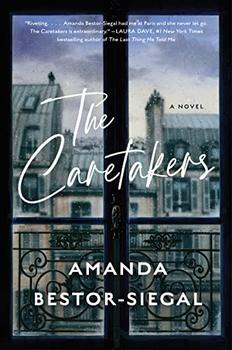Summary | Excerpt | Reviews | Beyond the Book | Readalikes | Genres & Themes | Author Bio

A Novel
by Amanda Bestor-Siegal
It's been a long winter.
The last time the sun made an appearance in Paris—an abnormally beautiful November evening, balmy and empty-skied—130 people were shot and killed while they dined, toasted friends, attended a concert. It's been raining ever since. Now, five months after the November 13 attacks, the joke signs on the Métro appear like some small badge of resilience, Paris rebelling against its own winter. We will laugh again, says each Métro station, the rats scuttling across the tracks, the odor of pee in every tunnel. It's okay to smile today.
Charlotte Chauvet will not smile. Neither will Alena, the girl in the cell. She is unaware of Paris's April Fool's joke, that the city is bouncing back. Her own winter has begun. She traces her fingers in dust on the floor, writing words in a language she no longer speaks—not French, not English. In her lap is a golden chain she's always worn around her neck, until recently, when the keepsake it held went missing. It occurs to her only now that her host child is dead that he might be the one who stole it.
In a small flat on the main boulevard in town, a short walk from the neighborhood where the Chauvets live, a French teacher named Géraldine brews a second pot of tea for the police officer who showed up at her door. The officer's name is Lucas Rivoire. He looks to be at least a decade younger than her, sandy-haired and bright-eyed despite the circumstances that brought him here. He's a rookie, she thinks. This might be the first home interview he's ever conducted. When Géraldine first opened the door, he let his uncertainty rush unchecked across his face. "Bonjour," he said slowly. "Vous êtes Géraldine Patel?"
"Oui," she said. "Je suis la prof de Français."
Later, Monsieur Rivoire asks Géraldine to refer to him by his first name, and she doesn't know whether this is an apology for his initial hesitation or because he dropped his tea the moment she placed it in his hands, shattering the cup on her kitchen floor. "Pardon, pardon," he says, repeatedly. His hands continue to shake even after Géraldine has cleaned up the mess, even after she's told him "C'est pas grave" five or six times. She doesn't blame him. She's impressed that she herself has dropped nothing, no blunders whatsoever since the news that morning. Alena is one of her best students. Was. Hardly the trace of an American accent. The au pair's impeccable French should not make the circumstances any more horrifying, but Géraldine is a language teacher, and it does.
"It's a terrible thing," Monsieur Rivoire says. "One of your students. This must be difficult for you."
The words are hollow, perfunctory. Géraldine thanks him anyway, because his face is earnest, because he keeps eyeing the floor where he shattered his cup. "I'm sure the child's death was an accident," she says, though she isn't sure of this at all.
"The circumstances were suspicious," he says. Then, as if worried he's overstepped: "Sorry."
All day Géraldine has repressed the urge to voice what everyone knows but won't say, that this is not the first tragedy to strike the Chauvet children. It was the gossip in every café a year ago: how the eldest son, handsome Victor Chauvet, sped his motor scooter into the park after hours, jumped the curb, and shot directly into an oak tree. He was drunk, the police said. Lost control of the bike. (Olive Faguin, who was walking her dog that night, swore to anyone who would listen that the boy aimed himself at the tree, like a dart to a bull's-eye.) Victor survived the crash, but according to rumor he was left disfigured. No one has seen him since.
Now, with this second (and fatal) incident, Géraldine's sympathy has curdled into suspicion. When does lightning ever strike twice? It must be the parents, the house. Alena did not work for the Chauvets at the time of the eldest son's accident, so surely, she had nothing to do with the youngest's.
Excerpted from The Caretakers by Amanda Bestor-Siegal. Copyright © 2022 by Amanda Bestor-Siegal. Excerpted by permission of William Morrow. All rights reserved. No part of this excerpt may be reproduced or reprinted without permission in writing from the publisher.
Your guide toexceptional books
BookBrowse seeks out and recommends the best in contemporary fiction and nonfiction—books that not only engage and entertain but also deepen our understanding of ourselves and the world around us.